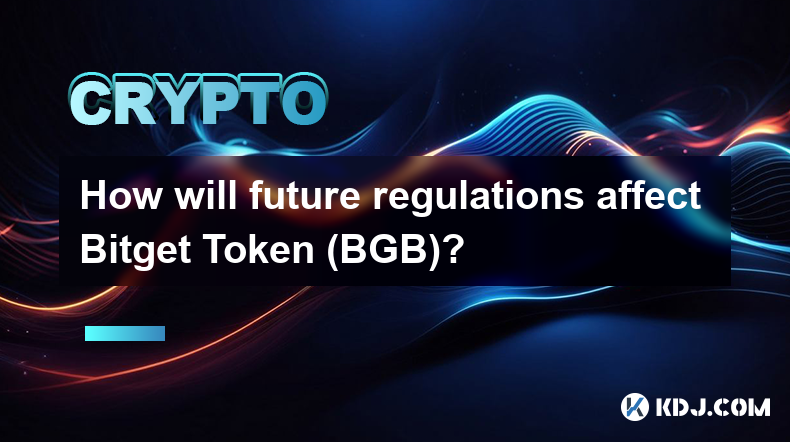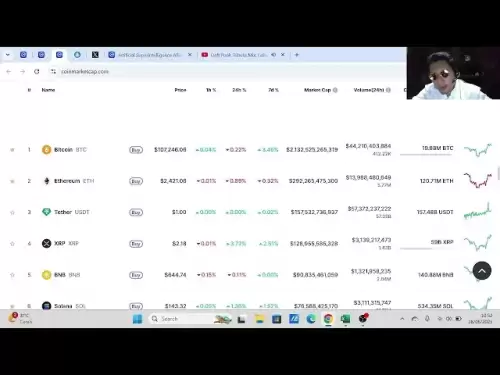-
 Bitcoin
Bitcoin $107,352.1067
0.28% -
 Ethereum
Ethereum $2,429.3531
-0.90% -
 Tether USDt
Tether USDt $1.0001
-0.02% -
 XRP
XRP $2.1894
4.62% -
 BNB
BNB $646.7968
0.36% -
 Solana
Solana $147.4290
4.03% -
 USDC
USDC $0.9998
-0.02% -
 TRON
TRON $0.2756
1.52% -
 Dogecoin
Dogecoin $0.1630
1.14% -
 Cardano
Cardano $0.5612
1.18% -
 Hyperliquid
Hyperliquid $37.0580
-0.05% -
 Bitcoin Cash
Bitcoin Cash $496.9410
-0.09% -
 Sui
Sui $2.7318
3.19% -
 Chainlink
Chainlink $13.1503
0.58% -
 UNUS SED LEO
UNUS SED LEO $9.0766
0.55% -
 Avalanche
Avalanche $17.7220
1.46% -
 Stellar
Stellar $0.2380
1.52% -
 Toncoin
Toncoin $2.8439
0.38% -
 Shiba Inu
Shiba Inu $0.0...01143
1.84% -
 Litecoin
Litecoin $85.8053
1.47% -
 Hedera
Hedera $0.1483
2.70% -
 Monero
Monero $314.3240
2.12% -
 Bitget Token
Bitget Token $4.6725
0.77% -
 Dai
Dai $1.0000
0.00% -
 Polkadot
Polkadot $3.3555
1.28% -
 Ethena USDe
Ethena USDe $1.0001
0.02% -
 Uniswap
Uniswap $7.0890
2.64% -
 Pi
Pi $0.5355
-3.40% -
 Pepe
Pepe $0.0...09393
1.06% -
 Aave
Aave $256.8136
-1.90%
How will future regulations affect Bitget Token (BGB)?
As regulations loom, Bitget Exchange and other cryptocurrency exchanges must navigate the changing landscape to maintain the resilience of their native tokens, such as Bitget Token (BGB).
Dec 26, 2024 at 12:55 am

Key Points:
- Understanding the Regulatory Landscape for Cryptocurrency Exchanges
- Potential Impacts of Regulations on Bitget Token (BGB)
- Strategies to Enhance BGB's Resilience in a Regulated Environment
How Will Future Regulations Affect Bitget Token (BGB)?
The future of cryptocurrency exchanges, including Bitget, hinges on the impending regulatory landscape. As governments worldwide strive to establish regulations for the burgeoning industry, the potential implications for Bitget Token (BGB) and other exchange tokens are far-reaching.
1. Regulatory Scrutiny of Cryptocurrency Exchanges
Governments are increasingly recognizing the importance of regulating cryptocurrency exchanges to protect investors and safeguard financial systems. Regulations may focus on various aspects, including:
- KYC (Know Your Customer) and AML (Anti-Money Laundering) procedures to combat fraud and illegal activities.
- Capital adequacy requirements to ensure exchanges have sufficient reserves.
- Trading data transparency to prevent market manipulation and provide oversight.
2. Potential Impacts of Regulations on BGB
Regulations could have a significant impact on BGB, as follows:
- Increased Compliance Costs: Exchanges may face additional expenses in implementing and maintaining robust compliance measures. These costs could be passed on to users through higher trading fees or reduced rewards for BGB holders.
- Reduced Trading Volume: Stricter regulations could lead to decreased trading volume on exchanges, potentially affecting the demand for BGB and its price.
- Limited Leverage: Some regulations may restrict the use of leverage in trading, which could reduce the earning potential for BGB holders who engage in margin trading.
3. Strategies to Enhance BGB's Resilience
Bitget and other exchanges can implement various strategies to enhance BGB's resilience in a regulated environment:
- Robust Compliance Infrastructure: Prioritizing the establishment of a robust compliance infrastructure that meets regulatory requirements.
- Building Strategic Partnerships: Collaborating with reputable stakeholders, such as regulatory bodies and industry leaders, to gain insights and support.
- Utility and Value Proposition: Emphasizing the utility of BGB beyond trading, such as in ecosystem features, reward programs, or governance.
4. Key Considerations for BGB Holders
BGB holders should be aware of potential regulations and their implications:
- Monitor regulatory updates and assess their potential impact on BGB.
- Consider diversifying their portfolio into other cryptocurrencies or asset classes.
- Utilize BGB's utility and value proposition by participating in ecosystem activities or holding it as an asset.
FAQs
- What regulations are most likely to affect cryptocurrency exchanges?
Regulations related to KYC/AML, capital adequacy, and trading transparency are likely to have a significant impact. - How can exchanges prepare for future regulations?
Exchanges should prioritize compliance by implementing robust infrastructure, working with regulatory bodies, and enhancing the utility of their native tokens. - What are the potential risks to BGB holders from regulations?
Regulations may lead to increased compliance costs, reduced trading volume, and limitations on leverage, which could affect BGB's price and utility. - What strategies can BGB holders adopt to minimize risks?
BGB holders should monitor regulatory developments, diversify their portfolios, and leverage BGB's utility and value proposition. - How will Bitget respond to future regulations?
Bitget is committed to working with regulatory bodies, implementing compliance measures, and enhancing the utility of BGB to navigate the regulatory landscape effectively.
Disclaimer:info@kdj.com
The information provided is not trading advice. kdj.com does not assume any responsibility for any investments made based on the information provided in this article. Cryptocurrencies are highly volatile and it is highly recommended that you invest with caution after thorough research!
If you believe that the content used on this website infringes your copyright, please contact us immediately (info@kdj.com) and we will delete it promptly.
- Pi2Day Disappointment: Why the Pi Network Community Is Losing Faith
- 2025-06-28 18:30:12
- Silver Lining: Robert Kiyosaki's July 2025 Silver Prediction
- 2025-06-28 18:30:12
- Gotta Go Fast! Sonic Speeds into Magic: The Gathering Secret Lair
- 2025-06-28 18:50:12
- Bitcoin Price Swings: Navigating Volatility and Predicting the Future
- 2025-06-28 19:10:14
- Meme Coins in 2025: Will Shiba Inu Make a Comeback?
- 2025-06-28 19:30:12
- Pi Network's AI App Studio and Staking Utility: Revolution or Red Herring?
- 2025-06-28 19:30:12
Related knowledge

How to customize USDT TRC20 mining fees? Flexible adjustment tutorial
Jun 13,2025 at 01:42am
Understanding USDT TRC20 Mining FeesMining fees on the TRON (TRC20) network are essential for processing transactions. Unlike Bitcoin or Ethereum, where miners directly validate transactions, TRON uses a delegated proof-of-stake (DPoS) mechanism. However, users still need to pay bandwidth and energy fees, which are collectively referred to as 'mining fe...

USDT TRC20 transaction is stuck? Solution summary
Jun 14,2025 at 11:15pm
Understanding USDT TRC20 TransactionsWhen users mention that a USDT TRC20 transaction is stuck, they typically refer to a situation where the transfer of Tether (USDT) on the TRON blockchain has not been confirmed for an extended period. This issue may arise due to various reasons such as network congestion, insufficient transaction fees, or wallet-rela...

How to cancel USDT TRC20 unconfirmed transactions? Operation guide
Jun 13,2025 at 11:01pm
Understanding USDT TRC20 Unconfirmed TransactionsWhen dealing with USDT TRC20 transactions, it’s crucial to understand what an unconfirmed transaction means. An unconfirmed transaction is one that has been broadcasted to the blockchain network but hasn’t yet been included in a block. This typically occurs due to low transaction fees or network congestio...

How to check USDT TRC20 balance? Introduction to multiple query methods
Jun 21,2025 at 02:42am
Understanding USDT TRC20 and Its ImportanceUSDT (Tether) is one of the most widely used stablecoins in the cryptocurrency market. It exists on multiple blockchain networks, including TRC20, which operates on the Tron (TRX) network. Checking your USDT TRC20 balance accurately is crucial for users who hold or transact with this asset. Whether you're sendi...

What to do if USDT TRC20 transfers are congested? Speed up trading skills
Jun 13,2025 at 09:56am
Understanding USDT TRC20 Transfer CongestionWhen transferring USDT TRC20, users may occasionally experience delays or congestion. This typically occurs due to network overload on the TRON blockchain, which hosts the TRC20 version of Tether. Unlike the ERC20 variant (which runs on Ethereum), TRC20 transactions are generally faster and cheaper, but during...

The relationship between USDT TRC20 and TRON chain: technical background analysis
Jun 12,2025 at 01:28pm
What is USDT TRC20?USDT TRC20 refers to the Tether (USDT) token issued on the TRON blockchain using the TRC-20 standard. Unlike the more commonly known ERC-20 version of USDT (which runs on Ethereum), the TRC-20 variant leverages the TRON network's infrastructure for faster and cheaper transactions. The emergence of this version came as part of Tether’s...

How to customize USDT TRC20 mining fees? Flexible adjustment tutorial
Jun 13,2025 at 01:42am
Understanding USDT TRC20 Mining FeesMining fees on the TRON (TRC20) network are essential for processing transactions. Unlike Bitcoin or Ethereum, where miners directly validate transactions, TRON uses a delegated proof-of-stake (DPoS) mechanism. However, users still need to pay bandwidth and energy fees, which are collectively referred to as 'mining fe...

USDT TRC20 transaction is stuck? Solution summary
Jun 14,2025 at 11:15pm
Understanding USDT TRC20 TransactionsWhen users mention that a USDT TRC20 transaction is stuck, they typically refer to a situation where the transfer of Tether (USDT) on the TRON blockchain has not been confirmed for an extended period. This issue may arise due to various reasons such as network congestion, insufficient transaction fees, or wallet-rela...

How to cancel USDT TRC20 unconfirmed transactions? Operation guide
Jun 13,2025 at 11:01pm
Understanding USDT TRC20 Unconfirmed TransactionsWhen dealing with USDT TRC20 transactions, it’s crucial to understand what an unconfirmed transaction means. An unconfirmed transaction is one that has been broadcasted to the blockchain network but hasn’t yet been included in a block. This typically occurs due to low transaction fees or network congestio...

How to check USDT TRC20 balance? Introduction to multiple query methods
Jun 21,2025 at 02:42am
Understanding USDT TRC20 and Its ImportanceUSDT (Tether) is one of the most widely used stablecoins in the cryptocurrency market. It exists on multiple blockchain networks, including TRC20, which operates on the Tron (TRX) network. Checking your USDT TRC20 balance accurately is crucial for users who hold or transact with this asset. Whether you're sendi...

What to do if USDT TRC20 transfers are congested? Speed up trading skills
Jun 13,2025 at 09:56am
Understanding USDT TRC20 Transfer CongestionWhen transferring USDT TRC20, users may occasionally experience delays or congestion. This typically occurs due to network overload on the TRON blockchain, which hosts the TRC20 version of Tether. Unlike the ERC20 variant (which runs on Ethereum), TRC20 transactions are generally faster and cheaper, but during...

The relationship between USDT TRC20 and TRON chain: technical background analysis
Jun 12,2025 at 01:28pm
What is USDT TRC20?USDT TRC20 refers to the Tether (USDT) token issued on the TRON blockchain using the TRC-20 standard. Unlike the more commonly known ERC-20 version of USDT (which runs on Ethereum), the TRC-20 variant leverages the TRON network's infrastructure for faster and cheaper transactions. The emergence of this version came as part of Tether’s...
See all articles
























































































